
Elections in Georgia are held to fill various state and federal seats. Regular elections are held every even year. The positions being decided each year varies, as the terms of office varies. The State Senate, State House and U.S. House will typically be up for election, as all of those positions have two-year terms. Special elections are held to fill vacated offices. Georgia is one of seven states that require a run-off election if no candidate receives a majority of the vote in a primary election. Uniquely, Georgia requires a run-off election for state and congressional offices if no candidate wins a majority of the vote in a general election; only Louisiana has a similar requirement, but it operates under a different election system.

The 1996 United States Senate elections were held on November 5, with the 33 seats of Class 2 contested in regular elections. Special elections were also held to fill vacancies. They coincided with the presidential election of the same year, in which Democrat Bill Clinton was re-elected president.
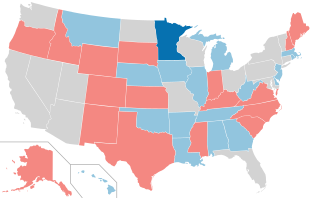
The 1990 United States Senate elections were held on Tuesday, November 6, 1990, with the 33 seats of Class 2 contested in regular elections. Special elections were also held to fill vacancies. The Democratic Party increased its majority with a net gain of one seat from the Republican Party. The election cycle took place in the middle of President George H. W. Bush's term, and, as with most other midterm elections, the party not holding the presidency gained seats in Congress. Until 2022, this had been the only election cycle where only one U.S. Senate seat flipped parties.

The 1972 United States Senate elections were held on November 7, with the 33 seats of Class 2 contested in regular elections. They coincided with the landslide re-election of Republican President Richard Nixon. Despite Nixon's landslide victory, Democrats increased their majority by two seats. The Democrats picked up open seats in Kentucky and South Dakota, and defeated four incumbent senators: Gordon Allott of Colorado, J. Caleb Boggs of Delaware, Jack Miller of Iowa, and Margaret Chase Smith of Maine. The Republicans picked up open seats in New Mexico, North Carolina, and Oklahoma, and defeated one incumbent, William B. Spong Jr. of Virginia.

The 1998 United States House of Representatives elections were held on November 3, 1998, to elect U.S. Representatives to serve in the 106th United States Congress. They were part of the midterm elections held during President Bill Clinton's second term. They were a major disappointment for the Republicans, who were expecting to gain seats due to the embarrassment Clinton suffered during the Monica Lewinsky scandal and the "six-year itch" effect observed in most second-term midterm elections. However, the Republicans lost five seats to the Democrats, although they retained a narrow majority in the House. A wave of Republican discontent with Speaker Newt Gingrich prompted him to resign shortly after the election; he was replaced by Congressman Dennis Hastert of Illinois.
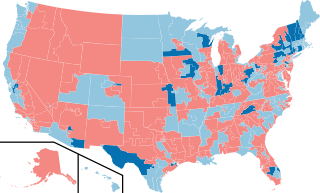
The 2006 United States House of Representatives elections were held on November 7, 2006, to elect members to the United States House of Representatives. It took place in the middle of President George W. Bush's second term in office. All 435 seats of the House were up for election. Those elected served in the 110th United States Congress from January 3, 2007, until January 3, 2009. The incumbent majority party, the Republicans, had won majorities in the House consecutively since 1994, and were defeated by the Democrats who won a majority in the chamber, ending 12 years of Republican control in the House.

A special election was held in California's 50th congressional district to choose a new member of the U.S. Representative to fill the vacancy caused by the resignation of Republican Randy Cunningham, who resigned November 28, 2005 after pleading guilty to bribery, wire fraud, mail fraud, and tax evasion charges..
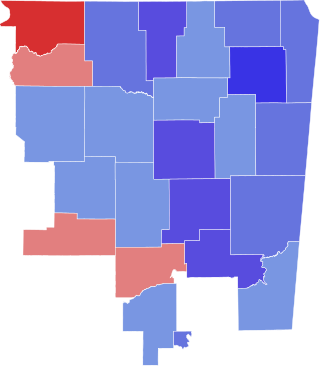
The 2008 Mississippi 1st congressional district special election was a special election in the state of Mississippi to determine who would serve the remainder of former Representative Roger Wicker's term. After an April 22, 2008 ballot resulted in no candidate receiving a majority, Democratic Party candidate Travis Childers defeated Republican candidate Greg Davis in a runoff election on May 13, 2008.

The 1992 United States House of Representatives elections in Texas occurred on November 3, 1992, to elect the members of the state of Texas's delegation to the United States House of Representatives. Texas had thirty seats in the House, apportioned according to the 1990 United States census.

The 1996 United States House of Representatives elections in Texas occurred on November 5, 1996, to elect the members of the state of Texas's delegation to the United States House of Representatives. Texas had thirty seats in the House, apportioned according to the 1990 United States census.
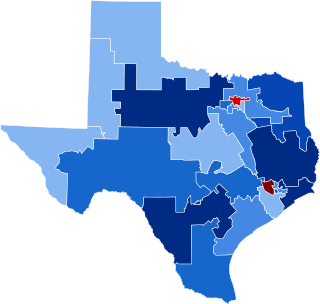
The 1976 United States House of Representatives elections in Texas occurred on November 2, 1976, to elect the members of the state of Texas's delegation to the United States House of Representatives. Texas had twenty-four seats in the House apportioned according to the 1970 United States census.

The 2018 United States elections were held on Tuesday, November 6, 2018. These midterm elections occurred during Incumbent Republican President Donald Trump's term. Although the Republican Party increased its majority in the Senate, unified Republican control of Congress and the White House was brought to an end when the Democratic Party won control of the House of Representatives in what was widely characterized as a "blue wave" election as Democrats also gained governorships and other state offices, and state legislative chambers as well.

A general election was held in the U.S. state of South Carolina on November 4, 2014. All of South Carolina's executive officers were up for election as well as both United States Senate seats, and all of South Carolina's seven seats in the United States House of Representatives.

A special election to determine the member of the United States House of Representatives for Georgia's 6th congressional district was held on April 18, 2017, with a runoff held two months later on June 20. Republican Karen Handel narrowly defeated Democrat Jon Ossoff in the runoff vote, 51.8% to 48.2%. Handel succeeded Tom Price, who resigned from the seat following his confirmation as United States Secretary of Health and Human Services in the Trump administration. The runoff election was necessary when no individual candidate earned the majority of votes in the election on April 18. Ossoff received 48.1% of the vote in the first round, followed by Handel with 19.8%.
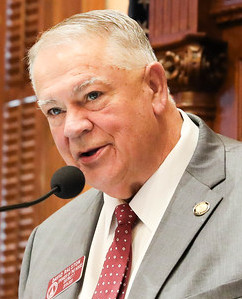
The 2018 Georgia House of Representatives elections took place as part of the biennial United States elections. Georgia voters elected state representatives in all 180 of the state house's districts. State representatives serve two-year terms in the Georgia House of Representatives.

These six off-year races featured special elections to the 113th United States Congress to fill vacancies due to resignations in the United States House of Representatives. Two were due to Congressmen taking seats in the United States Senate, one resigned to take jobs in the private sector, one resigned to take a job in the public sector, and one resigned due to an impending federal indictment regarding misuse of campaign funds.

The 2016 South Carolina Senate elections took place as part of the biennial United States elections. South Carolina voters elected state senators in all 46 districts. State senators serve four-year terms in the South Carolina Senate, with all the up for election each cycle.

The 2020 South Carolina State Senate elections took place as part of the biennial 2020 United States elections. South Carolina voters elected state senators in all 46 senate districts. State senators serve four-year terms in the South Carolina Senate, with all of the seats up for election each cycle. The primary elections on June 9, 2020, determined which candidates appeared on the November 3, 2020, general election ballot.

The 2021 Texas's 6th congressional district special election was held on May 1, 2021. The seat became vacant after incumbent Republican Ron Wright died on February 7 of COVID-19.

The 2017 United States state legislative elections were held on November 7, 2017. Three legislative chambers in two states held regularly scheduled elections. These off-year elections coincided with other state and local elections, including gubernatorial elections in two states.





















